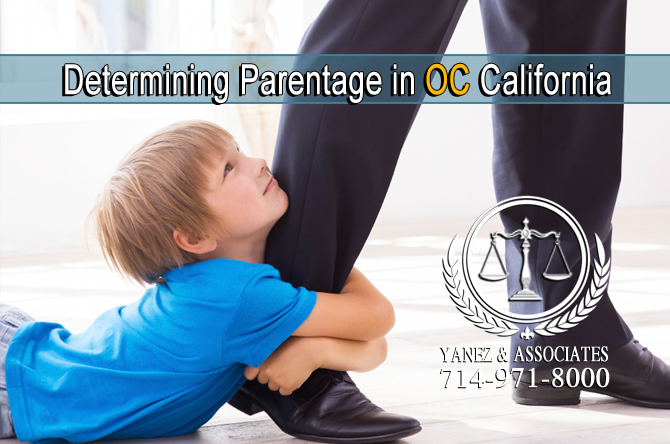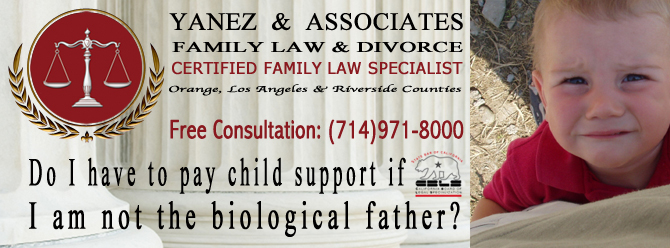FAQ: Do I have to pay child support if I am not the biological father? Am I expected to support a child in Orange County California if I am not the biological parent of the child?
Am I Required to Pay Child Support in California If I Am Not the Child’s Biological Parent?
In California, biological parentage does not play as big of a role in determining child support as legal parentage does. A legal parent has both the legal rights and legal obligations that come with raising a child, even if that parent is not the biological parent.
Depending on your situation, a biological parent may or may not be required to pay child support for a child in California, and a nonbiological parent or guardian may also be required to pay child support, or not.
What Are the Legal Rights and Obligations of a Parent in California?
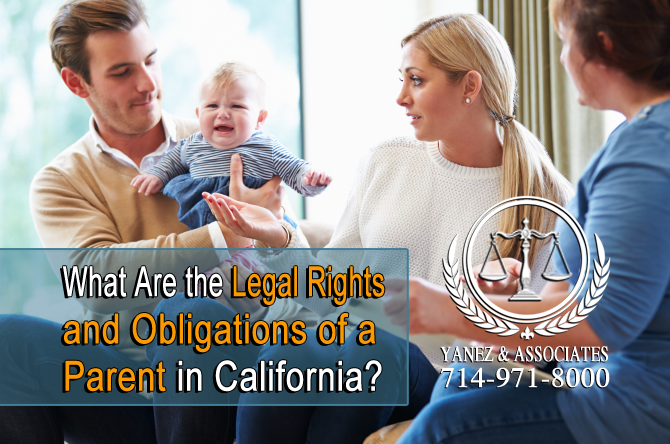
Under California law, when a child’s legal parent has been determined, that parent has both legal rights and legal obligations that come with being a parent. One of those obligations is paying child support.
However, when a person has been established as the legal parent or guardian of a child, they also have certain legal rights, including the right to custody and/or visitation of the child, as long as that custody or visitation is in the best interest of the child.
It is important to remember that in some cases, a parent may not immediately be awarded custody or visitation depending on the circumstances surrounding the child, his or her life, and his or her needs, as well as the parent’s situation. Just because a parent is denied the right to custody or visitation does not mean that they will never have custody or visitation, and it does not mean that a parent can get away with not paying child support.
If you are a legal parent or guardian of a child in California, you are legally required to pay child support. However, it does not necessarily mean that only the biological parents of a child are required to pay child support or that only the biological parents can have the right to custody or visitation with the child.
Determining Parentage in OC California
This is a legal way of simply saying that the State of California needs to know who a child’s legal parents are.
There are several ways that this can be done, and we will go over the basics of them below. Remember that if you are going through a parentage or paternity case, it is usually best to discuss your case with a qualified family lawyer in California so that you can make sure you understand how the law applies to your unique situation. No information that you find online can replace advice from a qualified attorney.
Assumed Legal Parentage in OC California
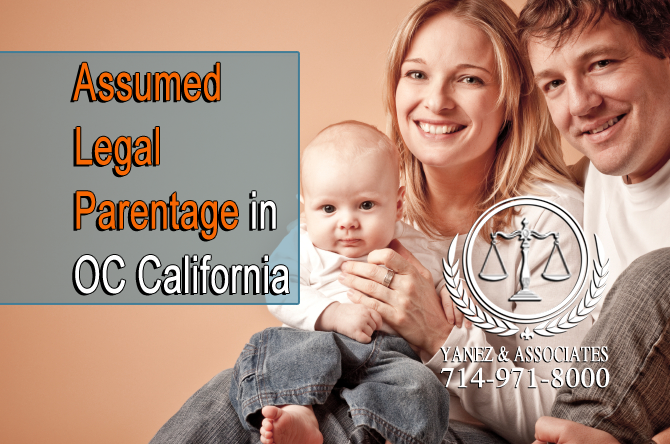
The simplest way to determine the parentage of a child is when the parents are either married or in a registered domestic partnership at the time the child is conceived or born.
In many cases, this is the biological parent of the child. However, there are several circumstances under which the State of California will assume a child’s parentage.
Married Parents
The simplest and easiest way to determine parentage in California is when two people are married at the time that the child is conceived or born. Usually, California law will assume that the married couple is the child’s parents, and paternity will be established automatically.
If the father is not the biological father of the child, he should speak to an attorney in California if he does not wish to be listed as the legal father of the child. If he does not, he will be legally and financially responsible for the child even in the case that he is separated or divorced from the mother/wife at a later time.
In this case, the two legal parents are responsible for financially supporting the child, and in the case that the married parents divorce, legally separate, or wish to have a child support order put into place, they will remain financially responsible for the child.
Registered Domestic Partners
As of January 1, 2005, two people who are in a registered domestic partnership in California at the time that the child is conceived or born are considered to be the child’s legal parents. Unfortunately, this law is relatively new and may require additional assistance from an attorney if child support is an issue.
In this case, the two registered partners are legally and financially responsible to support the child in the case that child support is necessary.
Other Assumed Parentage Situations
• If the parents attempted to marry one another, or the marriage was not valid, and it was during the time the child was either conceived or born, parentage may be assumed;
• If the mother and father married after the child was born, and the father has agreed beforehand to either support the child or to put his name on the birth certificate, parentage may be assumed;
• If the father openly welcomed the child into his home and treated the child as his own, it is called Parentage by Estoppel, and parentage will likely be assumed.
Unmarried Parents or Parents Not in a Registered Domestic Partnership in OC California
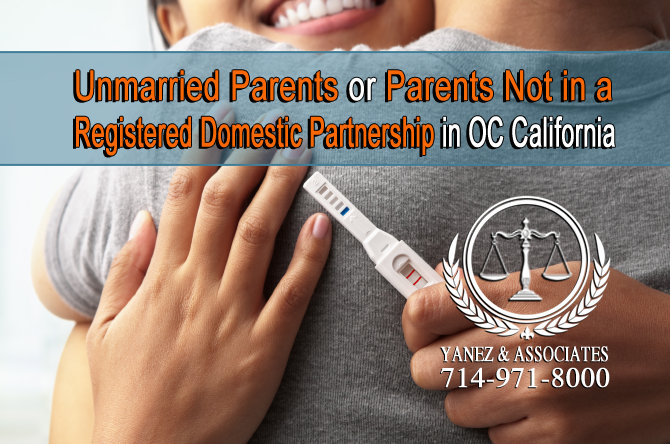
If a child is born to parents who are not married to one another, or parents who are not in a registered domestic partnership, determining parentage can be a little tricky. However, there are several ways that it can be done.
When a child is born, the biological mother is usually simple to determine. However, until parentage has been determined, a newborn child does not have a legal father. In order to require a person to pay child support, it must first be determined that he is the legal parent of the child.
Even if a father can prove that he is the biological father of the child, until he has legally established paternity, he will have no legal rights or obligations to the child.
Voluntary Declaration of Paternity
When a child is born, the parents can agree to sign a Voluntary Declaration of Paternity, which is a way to legally establish parentage in California. In order to be a valid and legally enforceable document, it must be signed voluntarily and filed with the State.
Obtain a Court Order
Either on your own, or with the help of your local child support agency, you may open a case with the court to legally establish paternity in California. This would have the same effect as filing a signed Voluntary Declaration of Paternity, meaning that it would (hopefully) establish legal parents for a child.
Legal parents may or may not be the biological parents of a child, especially if the parents are unmarried and not in a registered domestic partnership. Legal guardians and adopted parents are another situation in California where the legal parents may not necessarily be the biological parents.
How Guardianship Works in California
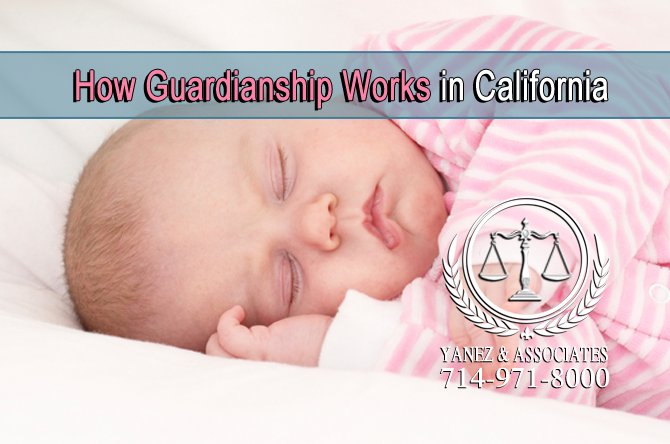
Guardianship is usually a temporary situation where the court orders a person other than the child’s legal parents to have custody of a child or to manage the child’s estate.
A guardian may be someone appointed by the court, or a family member or friend of the family. However, a guardian is usually not responsible to pay child support - the parent is usually required to continue paying child support even while the guardian takes custody of the child.
However, having guardianship of a child may require you to pay some of your own money while you are caring for the child. If you need assistance from either the child’s parents or from the government, you should contact an attorney or a local government agency.
The Basics of Adoption in California
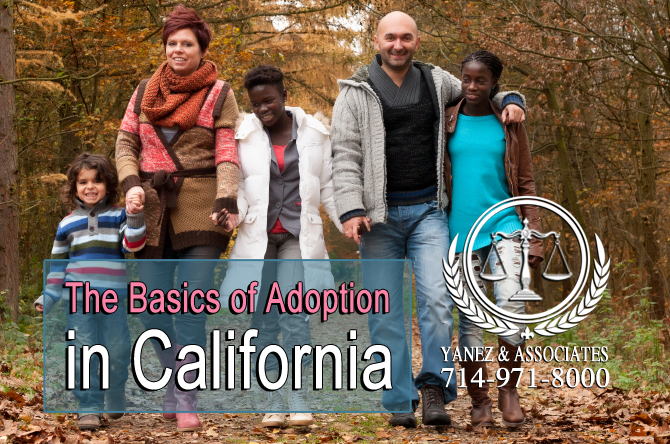
No matter who adopts the children, the new, adoptive parents are legally and financially responsible for supporting the children from that point forward.
When a child is adopted, the adoptive parents become the legal parents of a child. Adoption can be between a mother or family and another family, or it may be the adoption of a stepchild by a new spouse of either the mother or father.
No matter who adopts a child, the new, adoptive parents are legally and financially responsible for supporting the child from that point forward. The adoptive parents also take on all rights regarding child custody and visitation.
In this case, the biological parents would never have an obligation to support the child, however, they would also lose their rights to child custody or visitation. Biological parentage, in the case of adoption, has no effect on child support.
Are you faced with the following question, "Do I have to pay child support if I am not the biological father?" perhaps it is time to consult with a California Child Support Attorney
Our attorneys are here to help you through your family law issues. At Yanez & Associates, we offer free initial consultations so that you can get to know us, and we can get to know you and your case. Contact us today to schedule yours.


